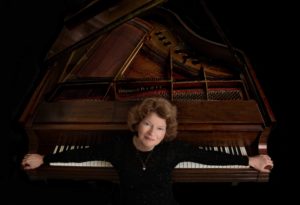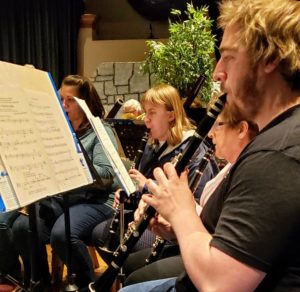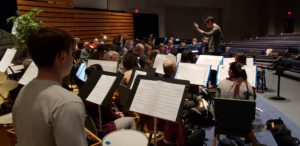By Tom Travis
Michigan composer and Saginaw resident, Catherine McMichael was commissioned by the Flint Symphonic Wind Ensemble (FSWE) to compose a work commemorating the 200th anniversary of Flint’s founding in 1819. The work was intended to be performed in the 2020 season but due to the COVID shutdown the FSWE did not perform a concert in 2020.

Composer Catherine McMichael. (Photo by Gregg Barckholtz: Portraits by Gregg)
Now, at last, the 14-minute long commissioned work, titled “Legacy,” will be performed at 3 p.m. Sunday, May 1 at the Flushing Mayfair Bible Church (5339 West Pierson Road) with Michael Keller conducting. The FSWE is only asking for a donation as admission to the concert.
Flint Symphonic Wind Ensemble performing music for 60 years
The FSWE was founded 60 years ago by Director-Emeritus Don Clough, according to the band’s Music Director, Chris Anderson. The band is open to anyone. There are no prerequisites other than you have to be able to play the music performed, Anderson says.

Members of the Flint Wind Ensemble Band during rehearsal for Sunday’s concert. (Photo by Tom Travis)
The 40-plus members of the band range from age 20 to some in their late 80s. “We have people who were music majors in college. We have people who only played in high school. We have people who put their instruments down for 30 years and then picked them back up. There is a wide, wide range of talent and experience,” Anderson says.
The band received the composition from the composer in late 2019, Anderson says, but with the COVID shutdown they were unable to rehearse
Anderson, who plays saxophone and trumpet, teaches elementary music in Saginaw Township. He has conducted the FSWE for three years.
Evolution of the composition
The composer, McMichael, began her work on the composition by considering what sounds were present during each decade depicted in the work: 1819, 1919 and 2019. “In 1819, when Flint was founded, the music you would hear would be Ojibwe, Native American songs and French voyager songs, and what you would hear in 1919 would be rag time and what you would hear in 2019 would be a big, broad, symphonic sound,” she explains,
The first movement, 1819, titled “River of the Fire Stone” pays tribute to the source of habitation – the Flint River, known to the Anishinaabe people (including the Ojibwe people) and French voyageurs as the River of the Fire Stone.
The second movement, 1919, titled “Roadster Rag” pays tribute to the “Fleur de Lis” Roadster first produced by Dort Motor Car Company in 1915.
The third movement, 2019, titled “Stalwart Souls” pays tribute to the endurance and optimism of today’s Flint residents.

A horn similar to this will be used in the performance of Legacy at Sunday’s concert. (Photo submitted by Catherine McMichael)
A car horn from a Dort built 1917 Fleur de Lis Roadster is featured in the second movement. “My dad used to have a 1920 Rolls-Royce and it had an a-hoo-ga horn. At that time there were a-hoo-ga horns all around and I thought, oh my gosh it’s got to have that in here,” McMichael says.
McMichael plays in a rag time orchestra, The River Raisin Ragtime Revue based in Tecumseh and Ann Arbor. “I’ve played hundreds and hundreds of rags,” she says, explaining she wanted the “cheerful and upbeat” sound of the rag to be in the piece. Compared to the sounds of the last movement, which McMichael says, “is not so much sad but somber and serious in mood.”
McMichael says she hopes the 14-minute work shows how Flint has “persevered and overcome and it continues to thrive as a city despite setbacks…I prefer to look at this piece towards the hopeful things.”
“I get a lot of my best ideas on long walks” – composer McMichael
McMichael says when she works on a composition she rarely sits at the piano, however she will eventually, to work some parts. “If you do that you’re limited to what you can play,” she says,
But she notes often ideas and inspirations will come to her during long walks. “I get a lot of my best ideas on long walks. You’re not boundaried by what your fingers can do. The themes can come and you can work it out.

The conductor’s scores of the three movements of Legacy composed by Catherine McMichael. (Photo by Tom Travis)
“I will eventually sit at the piano and work things out but that’s not usually where the ideas come from,” she adds. “The ideas come from long walks, a lot of research, talking to the client. One of the questions I ask the client, after I’ve talked with them, after this piece is played how do you want to feel? How do you want it to sound?”
“I love the drama and imagery in my music. I want the audience to go on a journey with the piece. I want them to feel differently at the end than they did at the beginning of the piece. I’m going to take them somewhere with the music. And once it’s done it’s up to the band to perform it. I write for the player. I want the player to love it. Because if they’re having a good time then the audience is having a good time,” she explains.
Describing the collaboration process, McMichael says she begins by having a conversation with the person who is commissioning the piece to find some common ground and answer the question, What’s this piece going to be about?
McMichael explains the collaboration with the FSWE came mainly through her association with St. Lorenz school in Frankenmuth and with Michael Keller.
McMichael, a resident of Saginaw, described her relationship with Flint as “peripheral.” She occasionally plays in the Flint Symphony Orchestra, and has taught at the University of Michigan -Flint and Flint Institute of Music.
“It’s a place that I visit and have friends,” she said.
McMichael’s life in music began when she was five years old. She calls herself an “intermediate” harpist. She “dabbles” in violin, can play the flute “a tiny little bit.” She claims she can’t “get a sound out of the clarinet” but composes music for all instrumentation including voice.
McMichael is a trained pianist with a B.A. in piano performance and an M.A. in chamber music from the University of Michigan.
“I’ve never studied composition or taken a composition course, I’m completely self-taught. I started out by writing duets to go along with Suzuki piano repertoire because I was a Suzuki piano teacher,” she says.
The wind ensemble band rehearses weekly in the gymnasium of Mayfair Church in Flushing. The Sunday concert will be held in the sanctuary. The FSWE used to rehearse in a local high school before the COVID shutdown, but as venues began to open up in 2021 the band looked for a new place to rehearse, Anderson said. After Sunday’s concert the band will break for the summer.
Guest conductor Michael Keller
Keller, a former FSWE conductor, returns to lead the band in the premier of “Legacy” at Sunday’s concert.
“We’re always looking for different things to do throughout the year. Sometimes we have guest musicians come in. I wanted to see if there was some kind of anniversary in 2019. I found out that the founding of Flint happened in 1819. So I commissioned Catherine McMichael, a Michigan composer,” Keller explains. The FSWE has performed McMichael’s works in the past.

Former FSWE conductor returns to lead the band in Sunday’s concert. (Photo by Tom Travis)
Keller describes the last movement, 2019, as combining all the movements into one, there are a lot of soaring musical horn lines, the melody is very majestic and opens with a “powerful” timpani solo and adds layers throughout the movement and incorporates “the eagle song” of the Ojibwe people.
Keller explains he reached out to McMichael and had an initial discussion over coffee at The Harvest House in Frankenmuth. Keller says he explained the band would like to commemorate the 1819 founding of Flint. McMichael then “went off and wrote for a couple of months and then she called me up and said, ‘Hey, I’ve got a product I want you to listen to.'”

Guest conductor Michael Keller in rehearsal with the FSWE for Sunday’s concert. (Photo by Tom Travis)
Keller says he went to McMichael’s home in Saginaw and listened to the piece. McMichael has a music software program that plays a simulation of her composition. They “combed through the scores together” and he offered suggestions and changes.
Keller plays the trombone in the Genesee Wind Ensemble. He has a B.A. in Music Education from Concordia University and a M.A. from VanderCook College of Music both in Chicago. He teaches fifth through eighth grade band and choir at St. Lorenz School in Frankenmuth.
EVM Managing Editor Tom Travis can be reached at tomntravis@gmail.com.


You must be logged in to post a comment.